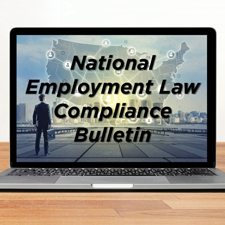After more than three years of COVID-19 compliance challenges in the United States, May 11, 2023 marked the end of the federal COVID-19 public health emergency (PHE) declaration, as well as the COVID-19 vaccine requirement for Federal employees, Federal contractors, and international air travelers.[1] While many COVID-19 related laws expired long before the end of the PHE, some remain in effect. Additionally, employers should also remember that some laws enacted during and in response to the COVID-19 PHE actually made permanent changes to laws (specifically, some unpaid state family leave laws), which may be triggered in the event of future public health emergencies.
In this blog post, we’ll remind you about a few laws that remain in effect, despite the end of the PHE:
- New York’s Paid Vaccine Leave: The law provides employees with four hours of paid leave per vaccine dose (including boosters), and was originally scheduled to expire at the end of 2022. The law was extended last summer, and is now scheduled to expire on December 31, 2023.
- New York Supplemental Paid Leave & COVID-19 Paid Family Leave: When New York legislators and the governor enacted supplemental paid sick leave and paid family leave requirements connected to COVID-19 in March 2020, they did not specify an end date nor did they include a “trigger provision” that details circumstances under which the obligation begins and ends. Generally, the state obligations still apply when there is a “mandatory or precautionary order of quarantine or isolation issued by the state of New York, the department of health, local board of health, or any governmental entity duly authorized to issue such an order due to COVID-19.” As a practical matter, New York now follows CDC guidelines, which no longer require precautionary quarantine for COVID-19 exposure, so this leave is likely to arise only where a person is isolating with an actual or suspected COVID-19 infection.
- Nevada Paid Vaccine Leave: Private employers with 50 or more employees in Nevada must provide all employees with up to four total hours of paid leave for the purpose of receiving a COVID-19 vaccine. Employees receiving a single-dose vaccine are entitled to use only two consecutive hours of vaccination leave, while employees receiving two doses are entitled to use two consecutive hours of vaccination leave per injection. Paid Vaccine Leave expires December 31, 2023.
- Nevada Public Accommodations Facilities COVID-19 Paid Leave: In Nevada, covered public accommodations facilities in Clark County (which included Las Vegas) and Washoe County (which included Reno) must provide paid time off for employees experiencing COVID-19 symptoms or who have been exposed to COVID-19. Although there no longer is a COVID-19 public health emergency in Nevada, this COVID-19 paid leave requirement continues to apply because the law did not establish a hard end date and instead set thresholds for the obligation to remain: when the COVID-19 positive test rate in the at-issue county exceeds 5% or new cases in the county exceed 100 per 100,000 residents, in any rolling 14-day period in the 90-day period preceding that day.
- New Jersey Family Leave Act: Permanent changes to the New Jersey Family Leave Act currently apply, so employees will qualify for leave if they need to be absent from work for certain reasons due to a state of emergency or when indicated by a public health official, an epidemic of a communicable disease, a known or suspected exposure to a communicable disease, or efforts to prevent spread of a communicable disease. The law addresses qualifying certification issued by a school, place of care for children, public health authority, or health care provider when an employee requests leave of under certain circumstances.
- Oregon Family Leave Act: Permanent changes to the Oregon Family Leave Act contain “trigger provisions” that apply when there is a public health emergency. Currently, there is no qualifying public health emergency (as the Oregon COVID emergency expired at 12:01 a.m. on April 1, 2022, and more recently, the emergency for respiratory syncytial virus (RSV) expired at 12:01 a.m. on March 6, 2023. But, if these, or other diseases, rise to the level of a public health emergency, expanded obligations could kick in.
As we move into the next phase, employers should continue to keep an eye on the paid and protected leave landscape in the locations where they have employees.
Questions?
Contact the author Sandy Andre.
Our National Employment Law Compliance team is ready to help, and can provide everything from comprehensive summaries of legal developments to state-specific policies to help you easily administer these issues (learn more).
National Employment Law Compliance Bulletin
Whether you have a handful of employees working remotely in different states or multiple workplaces across the country, we know you need to stay up-to-date with employment laws nationwide. We also know that trying to stay updated with the laws of multiple states – in addition to all of the other jobs that are required of the modern HR professional – is a daunting task. Never fear, the Miller Johnson National Employment Law Compliance practice group is here to help.
Our team of attorneys regularly track employment law developments in all 50 states. Every two weeks, we publish the Compliance Bulletin – a straightforward and comprehensive summary of nationwide legal developments that allows you to efficiently keep your finger on the pulse of employment laws that apply to your employees. As always, Miller Johnson’s team of employment and labor attorneys are ready to help when you want to update your policies, or if you need more information about a recent legal development. For more information about the Compliance Bulletin subscription, click here.
[1] HHS and DHS have announced that they have started the process to end their vaccination requirements for Head Start educators, CMS-certified healthcare facilities, and certain noncitizens as the land border.

